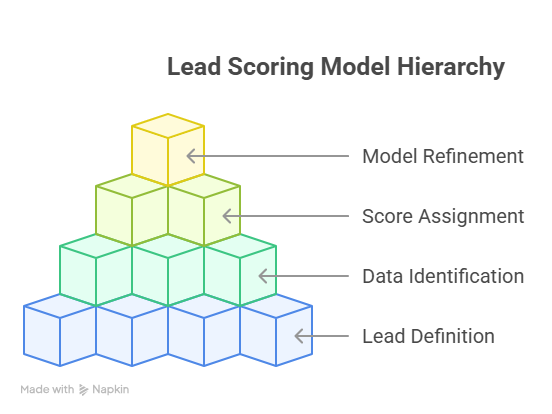Did you know that businesses using effective lead scoring can increase their conversion rates by up to 25%? This significant boost is a result of identifying and prioritizing high-quality leads, allowing sales teams to focus their efforts more efficiently.
Lead scoring is a methodology that ranks potential customers based on their behavior, fit, and other criteria. By understanding this concept, businesses can optimize their sales and marketing efforts, improving overall efficiency and revenue. In the context of CRM solutions, lead scoring plays a crucial role in enhancing the sales process.
This article will explore the concept of lead scoring, its significance in CRM solutions, and help you identify the best CRM for implementing this methodology.
Understanding Lead Scoring and Its Benefits
Lead scoring is a crucial aspect of modern sales and marketing strategies that helps businesses identify high-quality leads. By assigning scores to leads based on their behavior, characteristics, and engagement levels, companies can prioritize their efforts on the most promising prospects.
What Is Lead Scoring?
Lead scoring is a methodology used to rank leads based on their likelihood to convert into customers. This is achieved by assigning points to leads based on various factors such as demographic information, online behavior, and interactions with the company’s content. Effective lead scoring software enables businesses to automate this process, making it easier to identify and qualify leads.
Why Lead Scoring Matters for Your Business
Lead scoring matters because it helps businesses streamline their sales and marketing efforts. By identifying high-quality leads, companies can focus their resources on the most promising prospects, leading to improved conversion rates and increased revenue. Moreover, lead scoring enables businesses to enhance their lead management tools, ensuring that their sales and marketing teams are aligned and working towards common goals.
Key Components of Effective Lead Scoring Models
Effective lead scoring models rely on several key components, including:
- Clear definitions of what constitutes a qualified lead
- Identification of relevant demographic and behavioral data
- Assignment of scores based on lead behavior and characteristics
- Continuous monitoring and refinement of the lead scoring model

By incorporating these components and leveraging crm lead qualification capabilities, businesses can develop a robust lead scoring system that drives revenue growth and improves sales and marketing alignment.
Top Lead Scoring CRM Solutions
Selecting the right CRM with lead scoring capabilities is crucial for businesses aiming to optimize their sales processes. With numerous options available, it’s essential to understand the features and benefits of top CRM solutions.
Essential Features of Lead Scoring CRM Software
Effective lead scoring CRM software should have automated lead scoring capabilities, allowing businesses to qualify leads based on predefined criteria. It should also integrate seamlessly with existing marketing tools and provide actionable insights.
Best CRMs for Automated Lead Scoring
Several CRMs stand out for their automated lead scoring features. Let’s examine a few:
HubSpot CRM
HubSpot CRM offers robust lead scoring features, enabling businesses to create customized scoring models based on various factors, including contact behavior and profile information.
Salesforce
Salesforce is renowned for its comprehensive CRM capabilities, including advanced lead scoring algorithms that help in identifying high-quality leads.
Zoho CRM
Zoho CRM provides a user-friendly interface for implementing lead scoring, making it easier for businesses to adopt best lead scoring practices.
Implementing Lead Scoring in Your CRM Strategy
To effectively implement lead scoring, businesses should align their CRM with overall marketing goals and continuously refine their scoring models based on performance data.
Maximizing CRM Lead Generation with Effective Lead Scoring
Lead scoring models play a crucial role in enhancing CRM lead generation by identifying high-quality leads and streamlining the sales process. By implementing a robust lead scoring system, businesses can prioritize leads, improve conversion rates, and ultimately drive revenue growth.
Effective lead scoring enables businesses to tailor their marketing efforts and sales strategies to the most promising leads, resulting in more efficient CRM lead generation. By leveraging lead scoring models, companies can gain a competitive edge in their respective markets and achieve their sales objectives.
To get the most out of lead scoring, it’s essential to choose a CRM solution that seamlessly integrates with your lead scoring model. By doing so, businesses can automate lead scoring, reduce manual errors, and focus on high-value activities that drive growth.
FAQ
What is lead scoring, and how does it work?
Lead scoring is a methodology used to rank potential customers based on their behavior, fit, and other criteria. It assigns a score to each lead, allowing businesses to identify high-quality leads that are more likely to convert into customers.
What are the benefits of using lead scoring in my CRM?
Lead scoring helps businesses prioritize leads, enhance sales and marketing alignment, and ultimately drive revenue growth. It also enables companies to optimize their sales and marketing efforts, improving overall efficiency.
How do I implement lead scoring in my CRM strategy?
To implement lead scoring, you need to define your ideal customer profile, identify key behaviors and characteristics, and assign scores accordingly. You can then use a CRM with lead scoring capabilities, such as HubSpot CRM, Salesforce, or Zoho CRM, to automate the process.
What are the key components of effective lead scoring models?
Effective lead scoring models consider factors such as demographic data, behavioral data, and firmographic data. They also involve assigning weights to different criteria and adjusting the scoring system based on feedback from sales and marketing teams.
Can I automate lead scoring with my CRM?
Yes, many CRMs, including HubSpot CRM, Salesforce, and Zoho CRM, offer automated lead scoring capabilities. These tools use algorithms to score leads based on predefined criteria, saving time and improving accuracy.
How do I choose the best CRM for lead scoring?
When selecting a CRM for lead scoring, consider factors such as ease of use, customization options, and integration with other sales and marketing tools. You should also evaluate the CRM’s lead scoring algorithms and ability to automate the scoring process.
What are some best practices for lead scoring?
Best practices for lead scoring include regularly reviewing and refining your scoring model, using data to inform your scoring decisions, and aligning your sales and marketing teams around the scoring system.
How does lead scoring impact CRM lead generation?
Lead scoring can significantly improve CRM lead generation by helping businesses identify high-quality leads and prioritize their efforts accordingly. By focusing on the most promising leads, companies can increase conversion rates and drive revenue growth.

